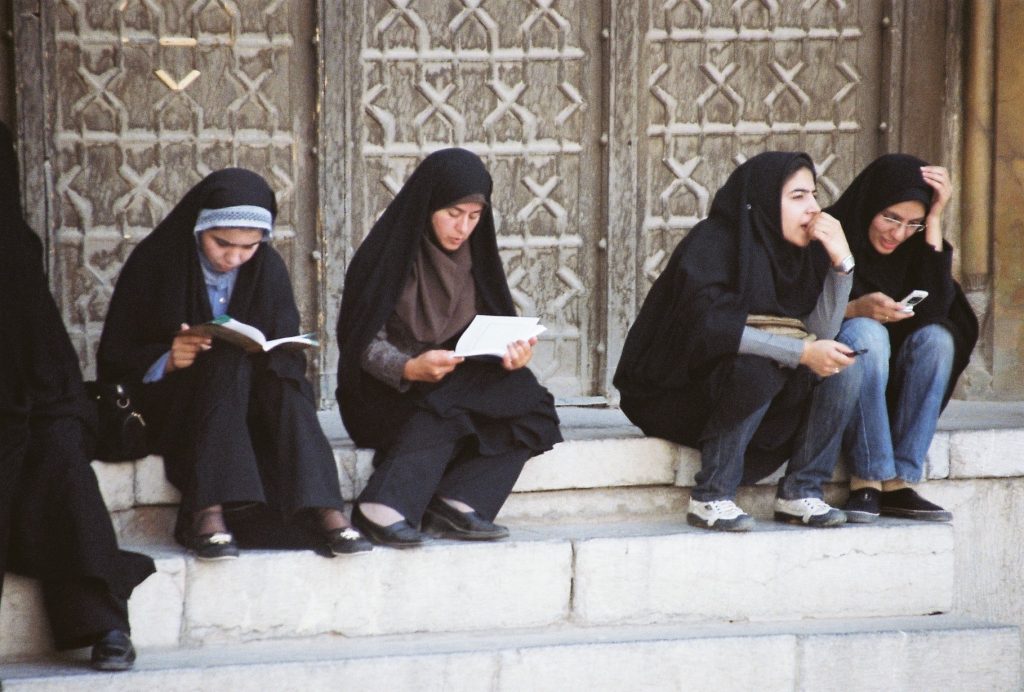To purchase the Fall 2020 Issue on Persecution, Guest Edited by Reginald Dwayne Betts, please visit our purchase page.
Foreword: A Requiem For Suffering
In editing this special issue of the Michigan Quarterly Review, an issue on persecution, I didn’t figure I’d find the intimacy of these poems, stories, and essays. Did not expect to be reminded, again, that while the commonality of the human experience is suffering, it is also tenderness, albeit a wayward tenderness. The soft touch that becomes a fist launched by someone you once loved—be that someone a man, woman, or country. And there is something irrevocably global about that realization.
When I was a young boy, less than a hundred yards of grass before my apartment building was an entire world. We’d play football there most days. And during one game, I watched a man brutally beat a woman with a bat. We were no more than ten years old, the ragged bunch of us, scuffed and dirty from rolling around in the grass during a game we called throwback. The game was every man for himself, and that man beating the breaks off of a woman I imagined he must have loved at some point was also only in it for himself. Persecution. A kind of thing that haunts. Reading Randall Horton’s essay, “And So, It’s Complicated,” brings back that moment. Argues that our failure to move, to call the police, to shout stop might have been related to our knowledge of how not minding your business can have ill rewards. Or, just maybe, some of us recognized the beatings from what we heard in the apartments above us, the apartments alongside us, the apartments we called home — and that knowledge stilled our tongues.
This special issue on persecution suggests that we have, from the outset, accepted some premise about the wide-scale nature of persecuting. Persecution is both as American as apple pie and as human as breathing. And not talking about it doesn’t make it less so. This collection is an account of multitudes. Stunning how the commonality from country to country, from story to story to poem to essay, from image to image, from it all is that we can know one another more deeply if we listen to how others have hurt us. Though hurt is only a part of persecution. There is not, necessarily, a history to hurt. Persecution is hurt with a history, suffering that has become the emblem of the power that someone else wants to hold dear.
This is the lesson of these poems, stories, and essays—that taking a true look at persecution requires something of a historical approach. Remembering. Wesley Brown’s novel Tragic Magic was originally published in 1978. Returning to it now reminds us of Toni Morrison, the editor who brought it to print, and of the long engagement that American writers have had with prison. This pre-mass incarceration tale gives us prison as persecution for protest. The clip we reprint here introduces you to Ellington, a Vietnam dissenter, and his attempts to duck a more visceral persecution inside the tombs where we still have more than two million people buried. Ravi Shankar’s essay complicates and expands Brown’s excerpt. The excerpt from Justin Rovillos Monson’s poem “Pre-Sentence Investigation” and Vivian D. Nixon’s “Mutiny” also tell stories of incarceration, though their
work, of the present, demands we ask different questions. Monson’s poem, a reimagined pre-sentence report, offers a speaker confessing guilt and forcing the reader to ask, if guilty, is this thing that we do to people justified? Nixon’s “Mutiny,” alluding to the large number of women incarcerated for killing their abusers, turns the centuries-long occupation with the notion of beauty into a haunting critique. In “Hold Your Mud,” Shankar writes of his experience as a college professor serving a short sentence in a Connecticut jail. An Indian American poet, Shankar gets at something central to what I imagine we mean when we say that prison persecutes. He writes:
I can feel simultaneously my distance from and my feelings of solidarity with them. My skin color is certainly on the spectrum—as Weezy once told me, “if your skin’s darker than a grocery bag, you’re screwed!”—but my upbringing and education and prospects are so different than these men, which might be why many of them entreat me to tell their stories when I get out. Yet much as I would like to tell myself how different I am from them, here I am with them in lockdown, being counted and surveilled. That’s what connects us, whether descended from generations of Tamilian Brahmins or Louisiana sharecroppers, our mutual experience of mass incarceration makes us want to scream invectives into the air, but we know if we do, we’ll be forcibly muzzled by the CO and maybe thrown into Seg, as solitary confinement is called.
Maybe I was bound to have a prison suite in any issue I edit on persecution in America—incarceration the flag for all those who suffer under countdowns and fistfights and the relentless oppression of time. These are the stories I know, of prison and incarceration. Crime and violence. A Black American, the cruelty of slavery abridging the stories of my past; as someone who has spent a third of his formative years in prison for carjacking a man; as someone with friends who’ve unjustly done decades—there is little room for me to think of persecution as unrelated to prison. And yet there are lessons in editing a special issue of a journal about persecution. Lessons that reveal how distinctly global persecution is, an invention distinctly human in its inventiveness and surety.
This collection is meant to give readers something to contemplate. The narratives of persecution are unwieldy and refuse to adhere to any strict orthodoxies. They also refuse to be buried by history. Take Esmat Elhalaby’s essay “Los Angeles Intifada.” Writing about a time nearly a decade before my birth, Elhalaby tracks a particularly brutal series of bombings and acts of violence by the Jewish Defense League. After the bombing of the Lebanese consulate on Hollywood Boulevard, then Lebanese consul general Wadih Dib asks, “Who would do this?” And in that question, the commonality of those persecuted is revealed. Who would do any of this? The question would seem trite if it were not echoed by so many pieces of writing that crisscross this world. In “Another Escape,” by Gloria L. Huang, one of the first lines is uttered by a young child: “they’re going to come and kill us.” In Loida Maritza Pérez’s “Tall Tales,” a father relies on sprawling and nearly mythic stories to explain what it means to live with the knowledge that informants can cause an entire family to be disappeared. “After My Honeymoon,” by Charles Cantalupo, tells the story of Rushet Woldedris, whose husband, a farmer, was captured and executed as if a soldier. These stories are all complicated and all written with a beauty that does what the most beautiful things always do: reveal everything, mask little, if anything at all.
The editing of this issue started in earnest as the entire world fell under a global pandemic. But it began pre-COVID-19, which is to say, it began before the air seemed liable to persecute us. There is a trick to that though. The air isn’t persecuting anyone. The air just doing what it do. The spittle that leaves our lips, the microscopic germs or whatever it is that this disease takes flight on is doing no more than what diseases do. Ain’t no on and off switch to it. But the days of being encamped at home, leaving only for groceries and soap and on occasion a walk made me know that there is something about persecuting that we have lost sight of. I noticed this especially as I found myself returning to this work, to the writing collected here.
When I first read Cynthia Steele’s translation of Sergio Mansilla Torres’s “Tithe of the Assassins,” I was struck by the line “many survivors of the carnage are writing their memoirs (a malady of old age).” But if it is true, that “only the dead still dream, as they did when they were children,” then we are lucky for those who still are willing to sing and who have lived long enough to know that blues in singing is a kind of survival. I have the mind of a poet. And the heart of a convict. I return to poetry and I return to prison. And I am thankful, always, to be reminded that someone has survived to tell the story of a place that doomed so many. And so I end this introduction with the work of a mentor and friend. In “Attica,” Afaa M. Weaver writes:
Were it not
for the heaviness of this coronavirus pandemic now,
I would not write this. In the morning I would smile
again, put up love again,
a fence . . .
against memory.
And maybe this is what all of us are confronting these days: the heaviness of the world. And in confronting it, those who remember surviving something will remind us to put up love again, that fence, against memory, if only for a moment.
Click here to purchase the Fall 2020 Issue on Persecution




